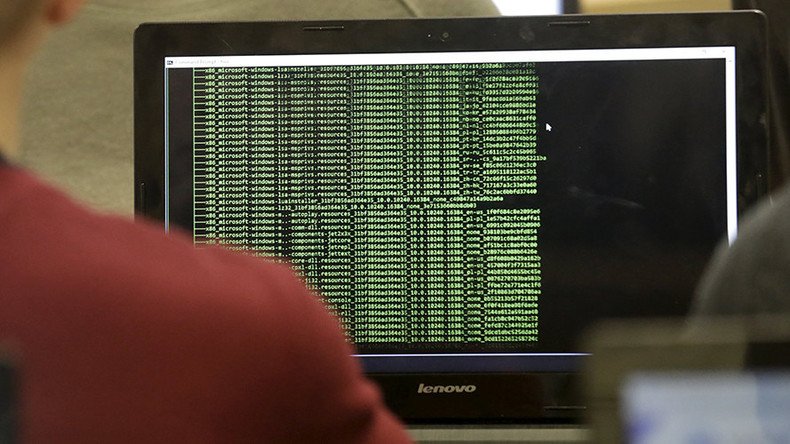Obama signs $1.1 trillion spending package, approves CISA surveillance legislation

President Barack Obama signed a $1.1 trillion spending package which bankrolls the government through next year. While it includes tax breaks for low-wage earners, it also includes a controversial cybersecurity measure slipped in during negotiations.
The omnibus spending package was signed into law on Friday afternoon.
“There’s some things in there that I don’t like, but that’s the nature of legislation and compromise, and I think the system worked,” the president said at his year-end news conference at the White House, reported the Associated Press. “It was a good win.”
AP ALERT: President Obama signs $1.1 trillion budget bill bankrolling federal government in 2016. pic.twitter.com/LD5R1DBtIt
— Courier-Post (@cpsj) December 18, 2015The legislation pairs two enormous bills: the $1.1 trillion government-wide spending measure to fund every federal agency through next September, and a $680 billion tax package.
The House of Representatives adopted the 2,000-page budget plan in a 316-113 vote on Friday, with the Senate voting 65-33 in favor.
The spending bill includes many of the increases Obama has demanded all year, with Republicans getting a big boost for the military and an end to a ban on exporting US crude oil for the first time in 40 years.
Some #science agencies are getting back to pre-sequester budget. More on #omnibus: https://t.co/qY855QVoZg@AAAS_GRpic.twitter.com/qGgjm7vlur
— Matt Hourihan (@MattHourihan) December 17, 2015The $680 million tax package includes tax breaks for college tuition, renewable energy such as solar and wind power, and breaks for low-wage earners. The bill also includes troop pay raises and prohibits the transfer of Guantanamo Bay detainees to the United States.
Mitch McConnell sneaks provisions into budget bill to further enable ‘dark money’
https://t.co/YV9FKiSofxpic.twitter.com/nrV9cQOd8j
— RT America (@RT_America) December 19, 2015As part of the budget negotiation, Obama also signed into law a large cybersecurity bill, which has been flogged by opponents as an expansion of government surveillance. Labeled the Cybersecurity Act of 2015, it is actually a combination of three bills passed by Congress over the year, including the often-criticized Cybersecurity Information Sharing Act of 2015 (CISA).
Congress passes Cybersecurity Information Sharing Act of 2015 attached to omnibus budget https://t.co/RRXalKOi8khttps://t.co/fvWz1LVQ9K
— Techmeme (@Techmeme) December 18, 2015The new law authorizes companies to share information about cyber threats with “any federal entity.” Any company participating in the data sharing would be immune from consumer lawsuits. Once the Department of Homeland Security has all the pertinent details, they could be passed along to the FBI and NSA for further investigation and, potentially, legal action.
Privacy advocates blast "disguised #surveillance bill" after CISA tucked into spending deal
https://t.co/yaK7OkbLVbpic.twitter.com/M8dnhNncMG
— RT America (@RT_America) December 17, 2015A leading opponent of CISA and government surveillance in general, Senator Ron Wyden (D- Oregon) voted “no” on the omnibus bill.
“These unacceptable surveillance provisions are a black mark on a worthy package that contacts the biggest tax cut for working families in decades, an accomplishment I fought for in weeks of negotiations,” Wyden said in a press release.
“Unfortunately, this misguided cyber legislation does little to protect Americans’ security, and a great deal more to threaten our privacy than the flawed Senate version. Americans demand real solutions that will protect them from foreign hackers, not knee-jerk responses that allow companies to fork over huge amounts of their customers’ private data with only cursory review.”
I voted against the omnibus because it contained CISA.
Pointblank: CISA harms security & liberty. I could not vote for that.
— Ron Wyden (@RonWyden) December 18, 2015Wyden said the latest CISA bill contains fewer oversight and reporting provisions than the Senate version did, and this means that violations of Americans’ privacy will go unnoticed. He added the bill strips authority from the independent watchdog on government surveillance, the Privacy and Civil Liberties Oversight Board, and makes it easier, especially for the CIA, to refuse to cooperate with the Board’s investigations.
“Reducing the amount of independent oversight and constricting the scope of the PCLOB’s authority sends the wrong message and will make our intelligence agencies less accountable,” Wyden said.











